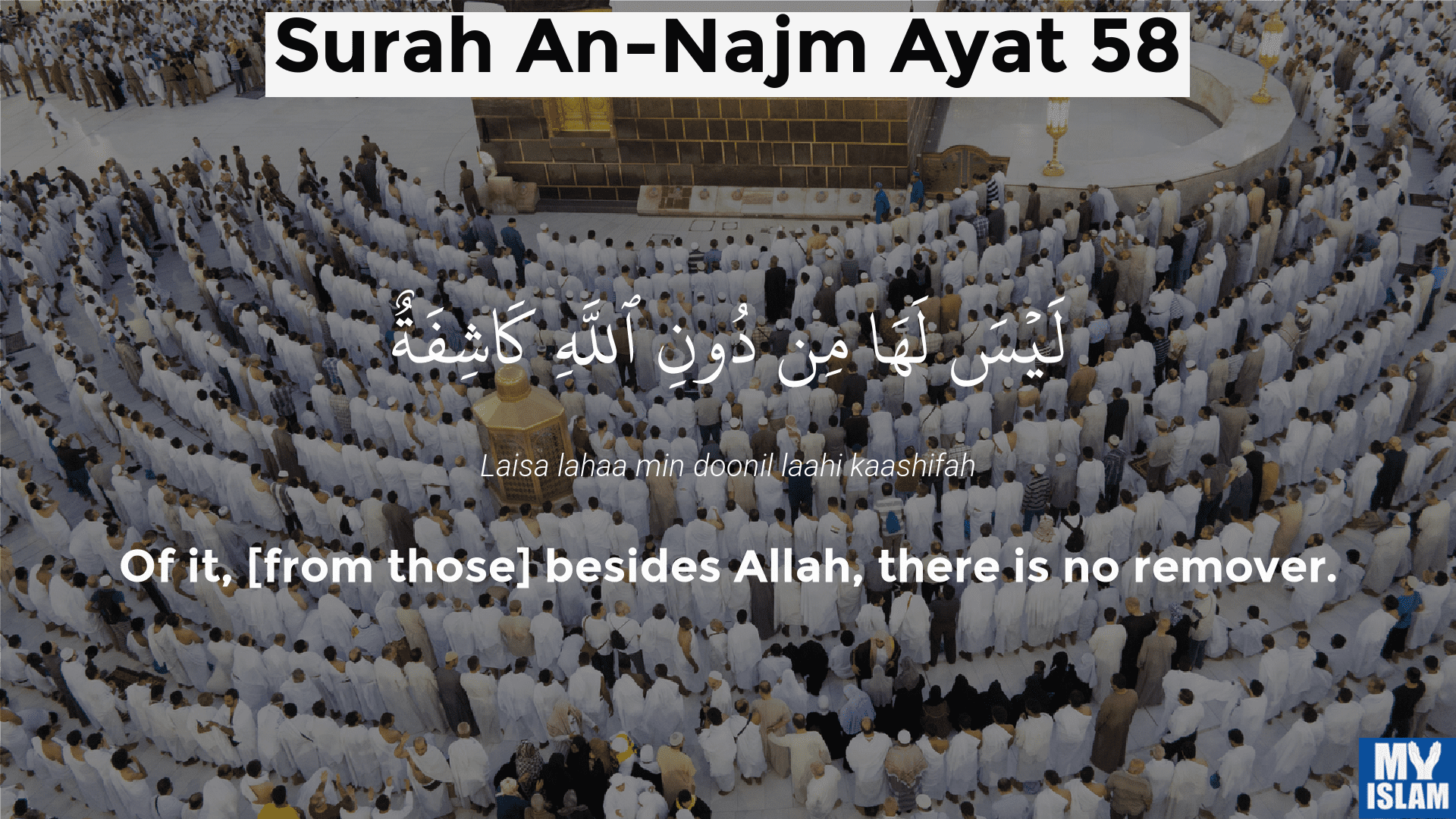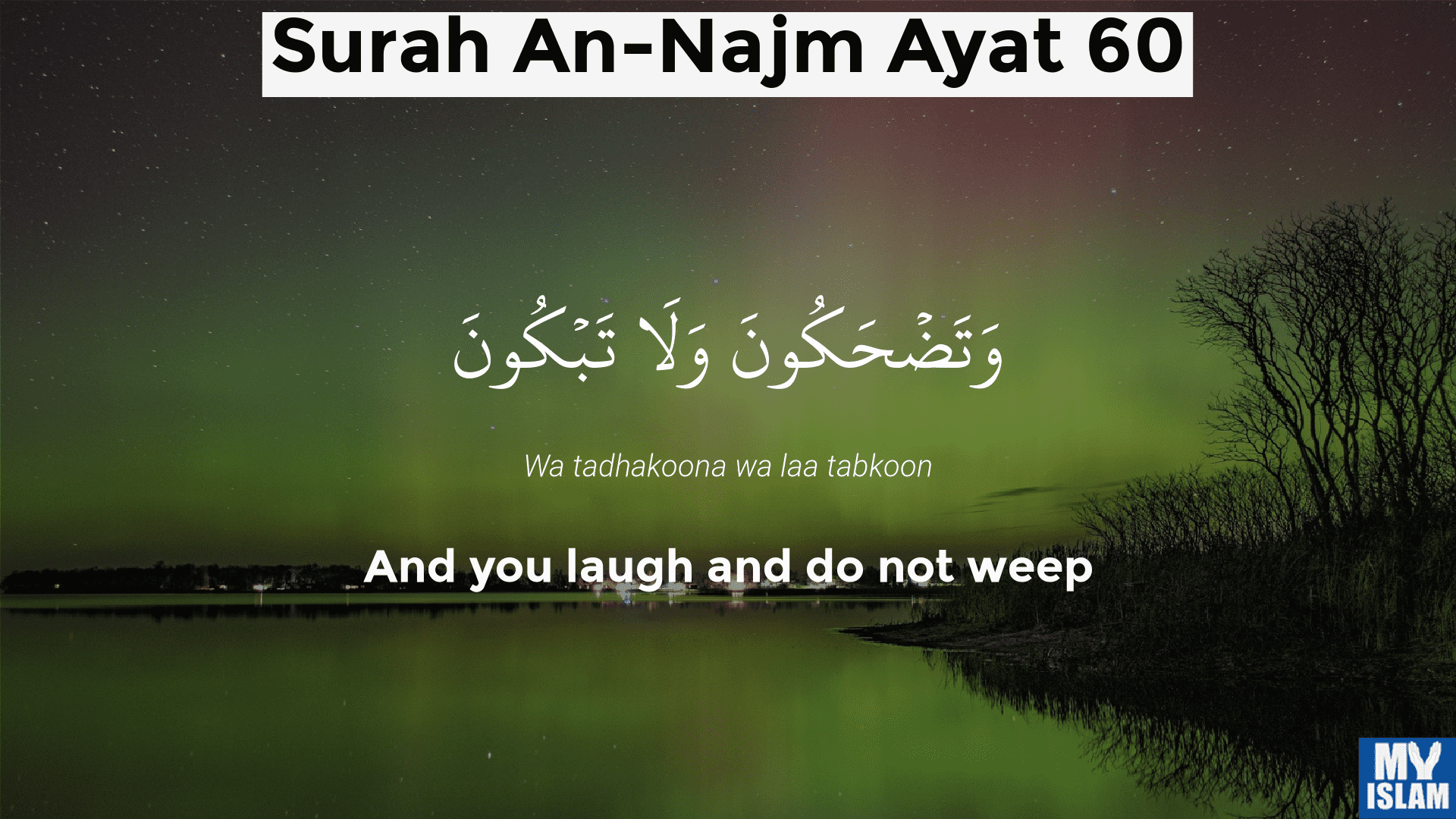Surah Najm Ayat 56 in Arabic Text
English Translation
Here you can read various translations of verse 56
This [Prophet] is a warner like the former warners.
This is a Warner, of the (series of) Warners of old!
This is a warning among the warnings of yore.
This (Muhammad SAW) is a warner (Messenger) of the (series of) warners (Messengers) of old.
This is a warner of the warners of old.
This is a Warner, of the earliest Warnings.
This is a warning just like the warnings sent in former times.
یہ (نبی) ڈرانے والے ہیں پہلے ڈرانے والوں میں سے
Quran 53 Verse 56 Explanation
For those looking for commentary to help with the understanding of Surah Najm ayat 56, we’ve provided two Tafseer works below. The first is the tafseer of Abul Ala Maududi, the second is of Ibn Kathir.
Ala-Maududi
(53:56) This is a warning among the warnings of yore.[49]
49. The words in the original are: Hadha nadhir-un-minan- nudhur-il-ula. The commentators have expressed three points of view in the explanation of this sentence. First, that nadhir here implies the Prophet Muhammad (peace be upon him); second, that it implies the Quran; third, that it implies the fate of the peoples already destroyed, which has been referred to in the foregoing verses. In view of the context, we are of the opinion that this last commentary is preferable.
Ibn-Kathir
56. This is a warner from the warners of old. 57. The Azifah draws near. 58. None besides Allah can avert it. 59. Do you then wonder at this reci- tation 60. And you laugh at it and weep not, 61. While you are Samidun. 62. So fall you down in prostration to Allah and worship Him.
Allah said,
(This is a warner) in reference to Muhammad ,
(from the warners of old.) means, just like the warners of old, he was sent as a Messenger as they were sent as Messengers. Allah the Exalted said,
(Say: “I am not a new thing among the Messengers.”)(46:9) Allah said;
(The Azifah draws near.) that which is near, the Day of Resurrection, has drawn nearer,
(None besides Allah can avert it.) no one besides Allah can prevent it from coming, nor does anyone know when it will come, except Him. The warner is eager to convey his knowledge of the imminence of a calamity, so that it does not befall those to whom he is a warner. As He said;
(He is only a warner to you in face of a severe torment.) (34:46) And in the Hadith:
(I am the naked warner,) meaning, I was in such a hurry to warn against the evil I saw coming, that I did not wear anything. In this case, one rushes to warn his people in such haste that he will be naked. This meaning befits the meaning of the A0yah,
(the Azifah draws near.), in reference to the nearing Day of Resurrection. Allah said in the beginning of the Surah:
(The Hour has drawn near.)(54:1) Imam Ahmad recorded that Sahl bin Sa`d said that the Messenger of Allah said,
(Beware of small sins! The example of the effect of small sin is that of people who settled near the bottom of a valley. One of them brought a piece of wood, and another brought another piece of wood, until they cooked their bread! Verily, small sins will destroy its companion, if one is held accountable for them.) Allah the Exalted admonishes the idolators because they hear the Qur’an, yet they turn away from it in heedless play,
(wonder) doubting that it is true.
(And you laugh) in jest and mock at it,
(and weep not,) just as those who believe in it weep,
(And they fall down on their faces weeping and it increases their humility.)(17:109) Allah said;
(While you are Samidun.) Sufyan Ath-Thawri reported that his father narrated that Ibn `Abbas said about Samidun, “Singing; in Yemenite dialect `Ismid for us’ means `Sing for us.”’ `Ikrimah said something similar. In another narration from Ibn `Abbas, he said that,
(Samidun) means, “Turning away.” Similar was reported from Mujahid and `Ikrimah. Allah the Exalted ordered His servants to prostrate to Him, worship Him according to the way of His Messenger, and to fulfill the requirement of Tawhid and sincerity,
(So fall you down in prostration to Allah and worship Him.) meaning, with submission, sincerity, and Tawhid. Al-Bukhari recorded that Abu Ma`mar said that `Abdul-Warith said that Ayyub said that `Ikrimah said that, Ibn `Abbas said, “The Prophet prostrated upon reciting An-Najm and the Muslims, idolators, Jinns and mankind who were present prostrated along with him.” Only Muslim collected this Hadith. Imam Ahmad recorded that Al-Muttalib bin Abi Wada`ah said, “While in Makkah, the Messenger of Allah once recited Surat An-Najm, then prostrated along with all those who were with him at the time. I raised my head, however, and I refused to prostrate.” Al-Muttalib had not embraced Islam yet, but ever since he became Muslim, he would never hear anyone recite this Surah until the end, without prostrating with whomever was prostrating after reciting it. An-Nasa’i also collected this Hadith in the Book of Al-Bukhari, excluding prayer in his Sunan. This is the end of the Tafsir of Surat An-Najm. All praise and thanks are due to Allah.
Quick navigation links






